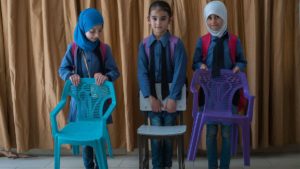

Reading, writing, counting — a few basic life skills that most of us were taught in elementary school. And though we may take these fundamentals for granted, these are the same skills that break down barriers to opportunity.
A basic education has the power to unlock a brighter future for children in every corner of the globe. But sadly, 274 million primary school kids worldwide are not learning the foundational skills that will help them lead healthy and productive lives. Far too often in developing countries and areas of conflict, teachers are forced to make do with limited resources and little training, making it nearly impossible for them to be successful.
In Jordan, teachers have been coping with a massive influx of Syrian refugee children. Years of violence and conflict in Syria have forced more than 4 million people to flee their homes and seek refuge in nearby nations. With over 650,000 registered Syrian refugees in Jordan alone, schools are feeling the impact.
The Jordanian school system has taken in over 143,000 refugee students and plans to enroll 50,000 more students next year. Coupled with severe overcrowding issues in classrooms, teachers are struggling to help students attain basic literacy and math proficiencies and are ill-prepared to handle the unique needs of Syrian pupils who have experienced extreme trauma.
This was certainly the case for students and teachers at the Khawla Bint Tha’alaba Primary Girls’ School in Jordan’s capital city of Amman — where one out of five students is Syrian.
“We had some Syrian students with unstable psychological situations,” said Maha Al Ashqar, the school’s Principal. “One came from an area that had been bombed, so she was fearful. Another student lost her father.”
Once, a determined and desperate Syrian woman named Lina came to Principal Maha — pleading to let her daughter Fatima enroll in school. Maha denied her request, explaining that the school didn’t have any room. As Lina persisted — refusing to take no for an answer — Maha finally agreed, but under one condition: “I told her that I will register your daughter if you bring a chair for her — even if it is a plastic chair,” Maha said.
Fatima was enrolled in the school and, as promised, brought her own chair. Now, thanks to help from USAID and RTI International, an array of colorful, child-sized plastic chairs litter the classrooms of Khawla Bint Tha’alabal — ensuring that a lack of seats no longer holds girls like Fatima back from getting the education they need and deserve.

Refugee girls at Khawla Bint Tha’alaba Primary Girls’ School holding the chairs they were asked to bring from home. photo credit: Thomas Cristofoletti for USAID
And chairs were just the beginning. The pilot project by USAID and RTI International reached more than 300 teachers in 41 schools—providing training in effective math and reading techniques, and distributing upgraded learning materials. As a result of the improved teaching methods, three-fourths of participating students improved their reading skills by one or more grade levels, and math comprehension improved 10 percent from the previous year.
Due to its great success, the program has since been expanded with the ambitious goals of reaching 400,000 Jordanian public schools and training 14,000 more teachers by 2019.
As we mark this World Teacher Day, we are reminded of the partnerships around the world that help to provide quality education in challenging times. Fatima and the girls of Khawla Bint Tha’alabal in Jordan are examples of the impact that can be made if teachers have the tools they need to succeed. Now is the time to double down on efforts to equip educators around the world with the resources and training needed to do their jobs— because an effective teacher can make a world of difference.
Maha Al Ashqar’s story original appeared here.
main image photo credit: Thomas Cristofoletti for USAID
Notifications